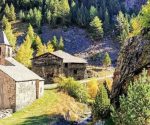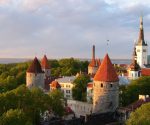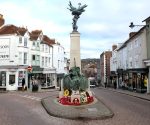People are only now discovering the origin of UK town names | UK | Travel

A variety of town names have the same origin (Image: Getty Images)
Ever wondered how your town or city acquired its name? Our place names regularly feature in our everyday discussions – whether we are discussing where we live, plan to move, or travel – and it is only now that people are beginning to understand their origins.
Around 10,000 years ago, as the last ice sheet withdrew and temperatures started to rise, humans began to resettle the British Isles. They started giving names to the things they discovered.
The most ancient place names often stem from Celtic and Anglo-Saxon languages and relate to the surrounding landscape, such as rivers, hills, or other geographical features. Personal names also play a major role in place names.
The abundance of Kingstons and Bishopstones shows that these locations were named after notable figures. Globetrots, a popular page on TikTok, regularly shares educational content and intriguing facts about the UK, covering everything from identifying the most dangerous areas to the worst roundabouts, and places with the strictest teachers.
Recently, the presenter on the page posed the question: “Have you ever wondered why so many places in the UK end with things like ‘ham’, ‘ton’, ‘by’ and ‘caster’?”. “Well there’s actually a reason this, they’re not just random endings.”
Globetrots, a renowned etymology expert, has shed light on the significance of ‘ham’ in British place names such as Nottingham, Birmingham, and Gillingham. The term ‘ham’ is derived from the Old English hām, which refers to a homestead or village.
According to Globetrots: “So, if your area ends in ham, it was probably settled by the Anglo-Saxons around 1,400 years ago.” The expert also touched upon the prevalence of ‘ton’ in British place names, citing examples like Taunton, Luton, and Brighton.
This suffix originates from the Old English word tūn, denoting a farm or enclosure – akin to an early form of village, thus revealing its Anglo-Saxon roots. “These ones are everywhere, kind of the ancient equivalent of a new build,” declared Globetrots.
Broadening the discussion, Globetrots analysed places ending in ‘by’, including Whitby, Grimsby, and Derby. In terms of linguistic context, they pointed out: “By literally meant village in Old Norse.
“These names are all over the north and east.” Lastly, the focus shifted to areas ending with ‘caster’, ‘chester’, and ‘cester’, covering Todcaster, Doncaster, Chester, Bicester, Colchester, Manchester, and Gloucester. All these suffixes have Latin origins, underscoring their historical importance.
The final observation from Globetrots revealed: “If your area ends with one of these, it started out as a military site over 1,800 years ago.” Wrapping up an intriguing series delving into the etymology of UK place names, a popular online page made a striking observation: “And if you map all these places out you can literally see how the UK was built.
“Anglo Saxon names in the south, Viking names in the east and north and Roman names clustered along old roads and frontiers. The names are basically 1,000 year old historical labels telling you who once claimed the land.”
English Heritage provided further insight, explaining: “You’ll begin to notice some simple suffixes like ‘ton’ (farm or hamlet), ‘ham’ (village or estate), ‘ly’ or ‘ley’ (wood or a clearing), ‘stow’ (place or meeting place) and ‘ bury ‘ (fort). These might be appended to names of local landmarks like rivers, making the meaning fairly obvious, as with the village of Isham in Northamptonshire.
“The river Ise is nearby, so Isham simply means ‘the village by the river Ise’.”
The video exploring these word origins has attracted more than one million viewers, generating numerous comments. One viewer noted: “Ham became hamlet, ton became town.”
Another shared their knowledge: “Something ends with ‘wick’ also came from ‘vik’ in Old Norse hence Viking influence.” A fellow user added: “Anywhere that ends in Bury is Anglo saxon. Usually means fortified town.”
Curiosity was piqued about other suffixes, leading to the question: “What about mouth? Weymouth, Plymouth, etc,” which received the response: “that usually means it’s by the sea, like the ‘mouth’ of the river as it reaches the sea”.
Viewers of the viral video expressed their astonishment and fascination, with comments such as: “That’s cool,” “That’s so crazy,” and “This is fascinating,” as many discovered the history behind UK place names for the first time.
“Everything means farm in old English,” joked another.









